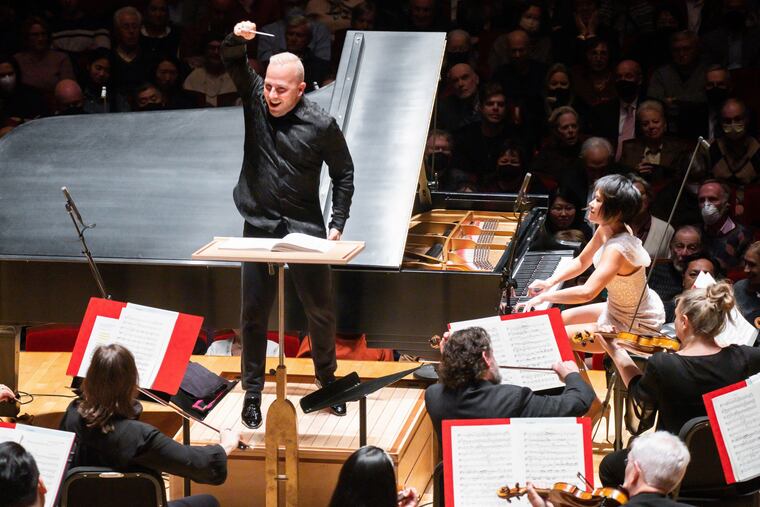Yuja Wang, five not-so-easy pieces, and the truth that Marilyn Monroe told
The Curtis Institute-trained pianist played a Rachmaninoff marathon with the Philadelphia Orchestra, and the winner was Rachmaninoff.

There’s a stunt-person element to Yuja Wang’s performance of five very major Rachmaninoff works for piano and orchestra in quick succession that has captured the public imagination.
“Daredevil pianist,” the headline on one article declared.
Should we be impressed by the feat? Yannick Nézet-Séguin was. Thursday night at the end of the first installment in the Philadelphia Orchestra’s Rachmaninoff cycle, the conductor dropped his body at the pianist’s feet and made gestures as if worshiping her.
But for anyone who knows Wang’s playing — especially any Philadelphian who has tracked her since her student days at the Curtis Institute — there was never any question about the pianist’s technique, speed, endurance or athleticism.
What’s been less clear is this: What is the artistic rationale for presenting five works by a composer who, after all, is already widely understood and, in Philadelphia, ever-present?
Let’s note first that Wang was terrific. Yes, she had deeper interpretive insights in some pieces than others. But the insights she did have were fascinating, and if the fact that the second night in Verizon Hall was more confident than the first is any indicator, the rest of this run (including Saturday’s single-shot marathon in Carnegie Hall) should only get better.
She clearly understood from the thunderous audience response Friday night that the only way to calm the crowd and send them on their way was with an encore at the opposite end of the emotional spectrum: an especially serene piano transcription of the “Melodie” from a 1762 opera, Gluck’s Orfeo ed Euridice. Here, Wang was a whispering poet.
But for me, these concerts worked on a level that had nothing to do with the soloist, and for that you only had to open your ears to the musicians of the orchestra. The group has grabbed hold of Rachmaninoff over the last decade in a way that sometimes seems more like a marketing ploy than an artistic discovery. But the cumulative effect of presenting the four concertos plus the Rhapsody on a Theme of Paganini over two nights made an important point. The composer isn’t the populist many think he is. There’s something more going on.
Rachmaninoff’s reputation never quite recovered after Marilyn Monroe. His music became shorthand for silly, overwrought fluff in Billy Wilder’s 1955 film The Seven Year Itch.
“It shakes me, it quakes me, it makes me feel goose-pimply good all over,” says Monroe, incapacitated by the music, as Tom Ewell seduces her with Rachmaninoff’s Piano Concerto No. 2.
Wilder’s mocking of Rachmaninoff aside, there’s a truth here. The composer works on at least two levels. The stirring melodies have wide appeal. But then there are moments where the music becomes harmonically ambiguous and it takes a little ear-stretching to even figure out what key we’re in. The emotional effects of the two together are powerful. That might isn’t fully felt in a second-class performance. But here, with the Philadelphians and Nézet-Séguin, they were visceral (“goose-pimply,” even).
Sometimes in a performance, there’s a stretch that stands out for how you can hear inspiration cascading upon itself, and that stretch came on Friday night in the first movement of the Piano Concerto No. 3. Wang paced the first part of the cadenza beautifully, starting small and building to an explosive climax. Then: flutist Patrick Williams, oboist Philippe Tondre, clarinetist Ricardo Morales, and hornist Jennifer Montone. Each player built on the beauty of the one before. Next, in the cadenza’s second part, Wang alighted on a hushed tranquility. An absolutely captivating sequence, this.
The pianist had some great qualities in the first concert, which featured the first and second concertos as well as the Paganini Variations — clarity, dash, and more than her share of sparks. But it was the second concert on Friday, with the third and fourth concertos and a repeat of the Paganini Variations, that grew confident enough to take some interpretive risks.
It was so in the Paganini Variations, which on the second night was friskier and more deeply felt than on the first. And it was true in the lesser-known Piano Concerto No 4. Wang heard parts of the third movement through the lens of Ravel-like colorings, which was a startling revelation. The orchestra’s skill in skittering from one perilous moment to another was a thrill.
More thrilling, still, was the way the brooding music of the first movement built to a crushingly intense apogee of orchestral sound. Here, you thought, was a moment possible only at the meeting of this orchestra and composer.
The two remaining concerts in the orchestra’s Rachmaninoff cycle with Yuja Wang, Feb. 4 and 5 in Verizon Hall, are sold out, but patrons may check for availability at philorch.org or 215-893-1999.